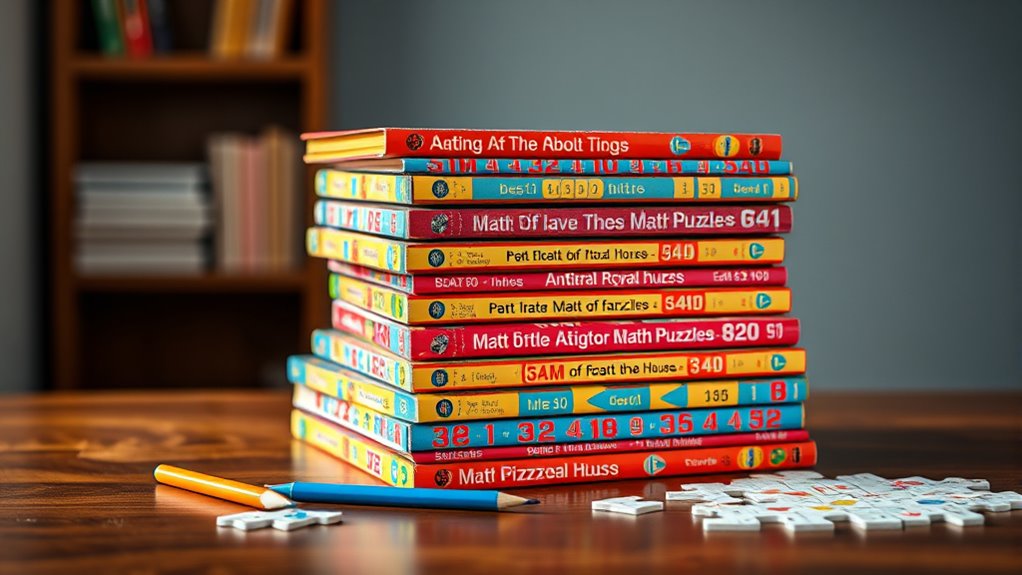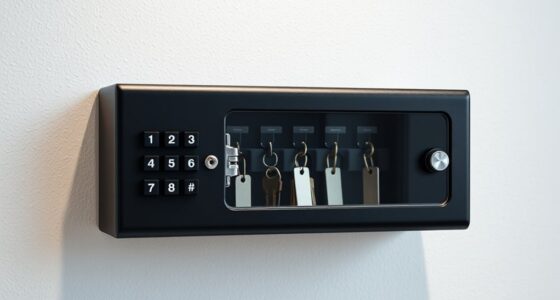If you’re looking for the top math puzzle books that truly challenge and delight, I recommend exploring classics like “The Moscow Puzzles” and “My Best Mathematical and Logic Puzzles,” which offer a variety of engaging, thought-provoking problems. Titles like “300 Math CrossWord Puzzles” and “Do the Math!” cater to different ages and skill levels, ensuring there’s something for everyone. Keep going, and you’ll discover even more exciting options to sharpen your mind.
Key Takeaways
- Look for collections featuring diverse puzzles across logic, number theory, and geometry to ensure a challenging and engaging experience.
- Prioritize books that include detailed solutions and explanations to enhance understanding and learning.
- Consider books with appealing visual design, clear instructions, and varying difficulty levels for sustained interest.
- Choose titles suitable for your age and skill level, from beginner-friendly to advanced, to match your challenge preference.
- Review user ratings and expert recommendations to find highly regarded puzzle books that delight and challenge readers.
The Moscow Puzzles: 359 Mathematical Recreations

If you’re looking for a challenging collection of puzzles that sharpen your logical and mathematical skills, “The Moscow Puzzles: 359 Mathematical Recreations” is an excellent choice. I find this book incredibly engaging because it covers a wide range of topics, from number theory to logic challenges, all designed to push your thinking. Some puzzles are straightforward, while others demand multi-step reasoning and creative problem-solving. I appreciate how it encourages outside-the-box thinking and perseverance. Whether you’re a student, teacher, or puzzle enthusiast, this collection offers both mental stimulation and a sense of accomplishment with each solution.
Best For: puzzle enthusiasts, students, teachers, and anyone seeking to enhance their logical and mathematical problem-solving skills through challenging and diverse puzzles.
Pros:
- Offers a wide variety of puzzles covering different topics such as number theory, logic, and visual calculations.
- Encourages outside-the-box thinking, perseverance, and creative problem-solving.
- Suitable for a broad audience, from children to adults, including educational and recreational use.
Cons:
- Some puzzles require visual aids or working on paper, which may reduce the recreational aspect for some users.
- Possible translation issues or typos could cause confusion or frustration.
- Certain puzzles involve obscure references or complex solutions that may be difficult for some solvers.
300 Math CrossWord Puzzles for Kids & Adults
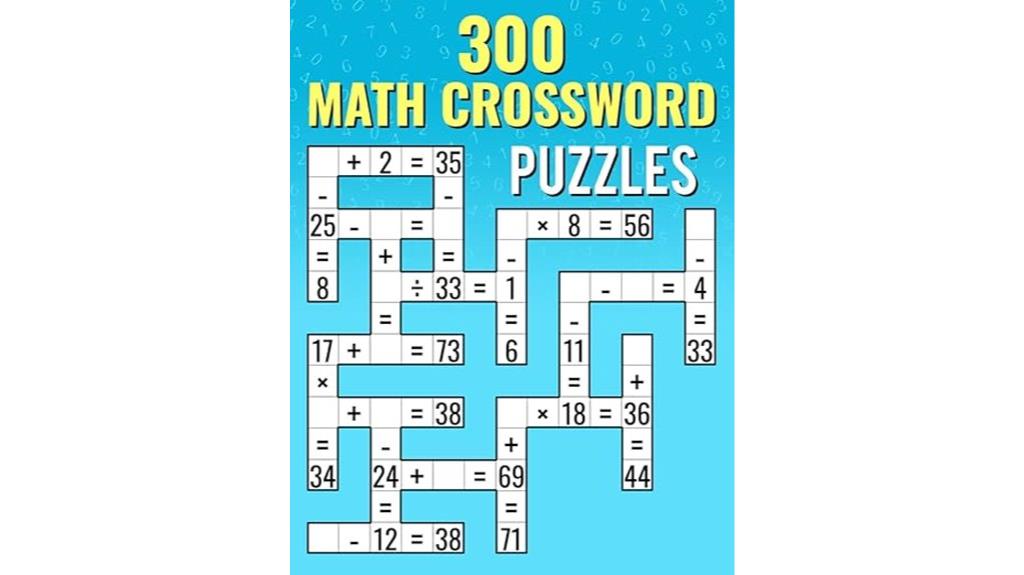
Looking for a fun way to sharpen your math skills while keeping it engaging? Math CrossWord Puzzles for Kids & Adults offers 300 puzzles that suit various ages, from 8-year-olds to seniors. I love how it combines challenge and entertainment, with problems covering addition, subtraction, multiplication, and division. The puzzles are designed to be tough yet enjoyable, encouraging mental agility without feeling overwhelming. The good-quality paper makes erasing mistakes easy, though the binding can be tight at times. Overall, I find this book a fantastic practice tool and a great way to keep my brain active, whether I’m solving alone or with family.
Best For: families, educators, and math enthusiasts seeking engaging and challenging puzzles for all age groups to improve mental agility and math skills.
Pros:
- Offers a wide range of puzzles covering addition, subtraction, multiplication, and division suitable for various skill levels.
- High-quality paper allows for easy erasing, making it user-friendly for practicing and correcting mistakes.
- Provides mental stimulation and fun for both kids and adults, encouraging family activity and individual practice.
Cons:
- The binding can be quite tight, making it difficult to view the central puzzles comfortably.
- Some users find the difficulty level could be increased gradually for more advanced learners.
- Minor physical issues like tight binding may affect the overall ease of use for some readers.
The Comedy of Numbers: Witty Math Challenges (Math Practice Workbook)
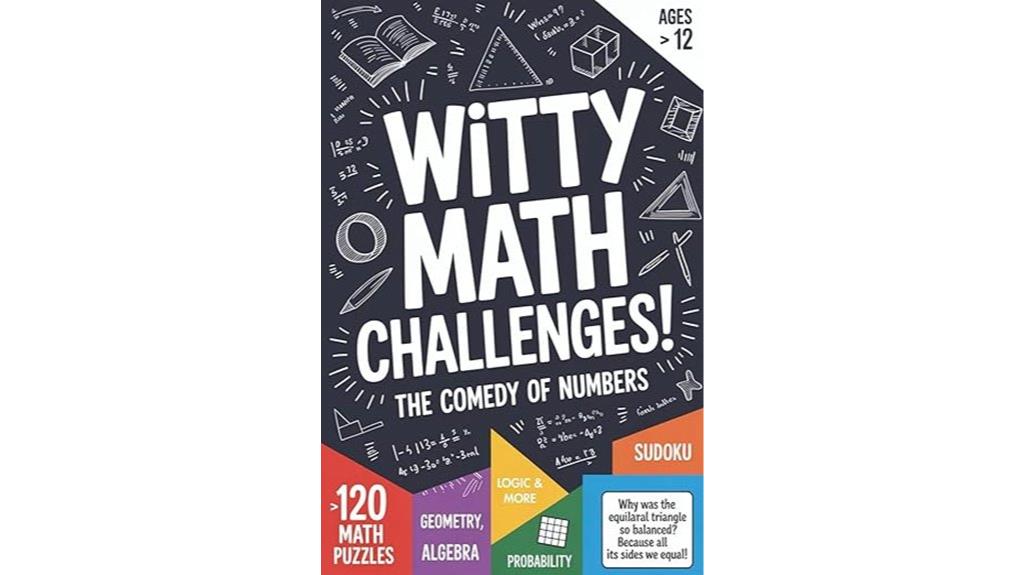
Are you someone who struggles with traditional math approaches or simply wants to enjoy math without the stress? “The Comedy of Numbers” stands out as an ideal choice for those seeking to make math both fun and accessible. With over 120 puzzles covering algebra, geometry, probability, logic, and Sudoku, it offers a diverse array that keeps boredom at bay. The humor and dad jokes sprinkled throughout make learning light-hearted and engaging. Clear explanations accompany each puzzle, helping you understand the reasoning behind answers and build skills. Whether you’re a student, adult, or parent, this workbook transforms math from a chore into an entertaining challenge.
Best For: anyone seeking to enjoy and improve their math skills through fun, engaging puzzles with humor, suitable for all ages from teens to adults.
Pros:
- Offers a wide variety of puzzles across different math topics to keep engagement high
- Incorporates humor and dad jokes that make learning enjoyable and light-hearted
- Provides clear explanations and solutions to help users understand and develop skills
Cons:
- Some users may desire more advanced or challenging puzzles for greater difficulty
- The humor style may not appeal to everyone, especially those preferring serious learning
- As a workbook, it may lack interactive digital features for tech-savvy learners
Do the Math!: Challenging, Fun Math Puzzles for Kids
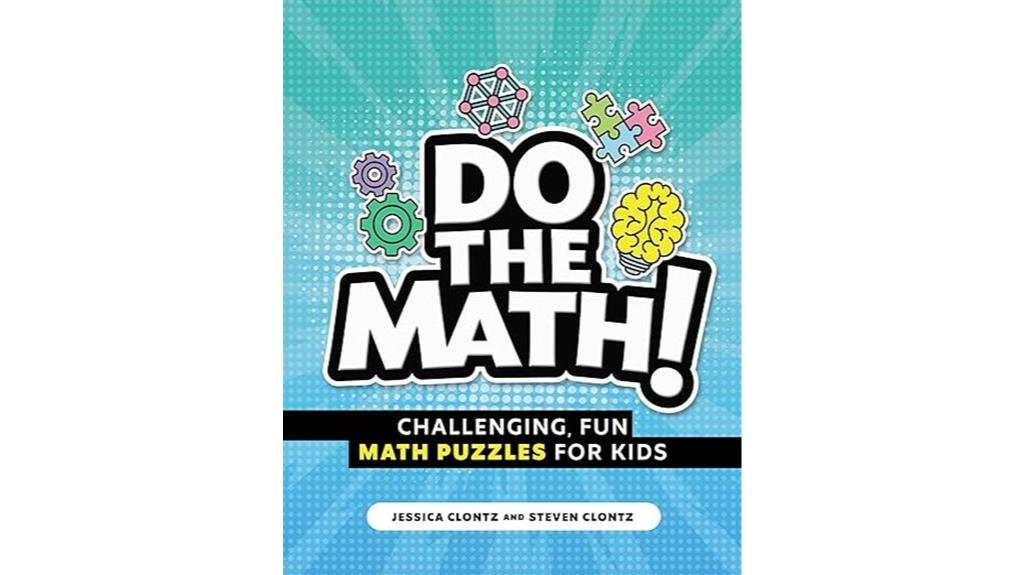
“Do the Math!: Challenging, Fun Math Puzzles for Kids” stands out as an excellent choice for parents and teachers seeking engaging activities that make math accessible and enjoyable. This book transforms math learning into an exciting adventure with puzzles like logic challenges, emoji math, and word decoding. Designed for children aged 6 to 12, it offers a range of difficulty levels to challenge gifted kids or those enthusiastic for more. Kids love solving these puzzles, and parents appreciate the motivation notes and variety that build critical thinking. Although it lacks answer keys, its creative approach makes math fun and fosters problem-solving skills, making it a highly recommended resource.
Best For: parents, teachers, and gifted children seeking engaging, challenging, and fun math puzzles to enhance critical thinking and problem-solving skills.
Pros:
- Offers a diverse range of puzzles including logic, emoji math, and word decoding to keep children engaged.
- Encourages creativity and exploration over rote memorization, making math enjoyable.
- Suitable for a wide age range, especially grades 4-6 and above, with varying difficulty levels.
Cons:
- Lacks answer keys or sample solutions, which may hinder independent learning.
- Some puzzles may be too challenging for younger or less experienced children without guidance.
- Limited guidance notes or hints within the book to assist children when stuck.
My Best Mathematical and Logic Puzzles (Dover Recreational Math)
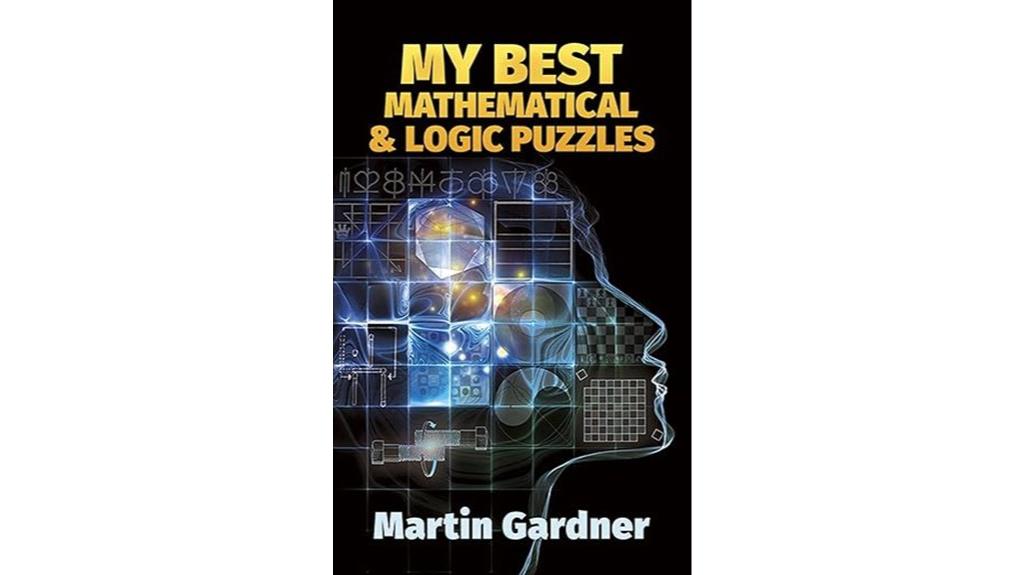
If you’re passionate about solving puzzles that challenge your logical thinking without requiring advanced mathematics, *My Best Mathematical and Logic Puzzles* from Dover’s recreational math series is an excellent choice. This book offers 66 curated puzzles from Martin Gardner’s Scientific American column, including classic and original problems across a broad difficulty spectrum. The puzzles emphasize reasoning, intuition, and lateral thinking, not complex math. Well-organized with clear text, graphics, and detailed solutions, it’s perfect for puzzle enthusiasts and learners alike. Gardner’s engaging style, combined with historical insights and stimulating challenges, makes this book a valuable resource for sharpening your mind and enjoying mathematical play.
Best For: puzzle enthusiasts and learners seeking engaging, logical challenges to sharpen their reasoning skills without requiring advanced math knowledge.
Pros:
- Curated collection of 66 puzzles from Martin Gardner’s renowned column, offering a mix of classic and original problems.
- Clear presentation with well-organized text, graphics, and detailed, insightful solutions.
- Suitable for a wide range of skill levels, from beginners to experienced problem solvers, emphasizing reasoning and lateral thinking.
Cons:
- The difficulty level varies, which might be challenging for some readers seeking consistent complexity.
- Focuses mainly on logical reasoning and puzzles, with limited emphasis on mathematical theory or advanced concepts.
- As a printed book, it may lack interactive or digital features that some modern puzzle platforms offer.
300+ Mathematical Pattern Puzzles: Number Pattern Recognition & Reasoning
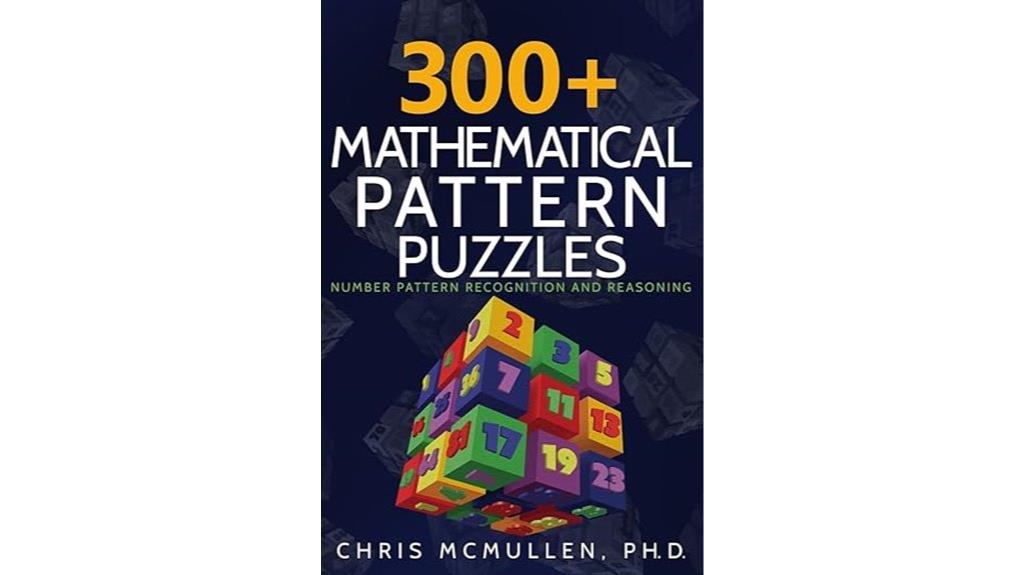
Mathematical pattern puzzles are an excellent choice for anyone looking to sharpen their logical reasoning and pattern recognition skills. I’ve found these puzzles to be both challenging and enjoyable, appealing to casual solvers and math enthusiasts alike. The book offers a well-structured journey, starting with simple patterns and progressing to complex sequences involving primes, factorials, and algebra. It’s perfect for students preparing for exams like the SAT or anyone wanting a mental workout. I appreciate the explanations and tools provided, which make tackling difficult puzzles rewarding. Overall, this collection keeps your mind engaged and helps develop critical thinking through fun, pattern-based challenges.
Best For: math enthusiasts, students preparing for exams like the SAT, and puzzle lovers seeking engaging pattern recognition challenges.
Pros:
- Provides a well-structured progression from simple to complex puzzles, enhancing learning and critical thinking.
- Includes explanations and tools that help users understand and solve challenging patterns.
- Suitable for a wide audience, from casual solvers to dedicated math enthusiasts, making it a versatile educational resource.
Cons:
- Some puzzles can be tedious or obscure, requiring additional effort or external searching for solutions.
- The difficulty level remains static, with limited variation or adaptive challenge progression.
- The layout demands searching for answers at chapter ends, which may be inconvenient for quick access.
600 CrossMath Puzzles for Kids and Adults
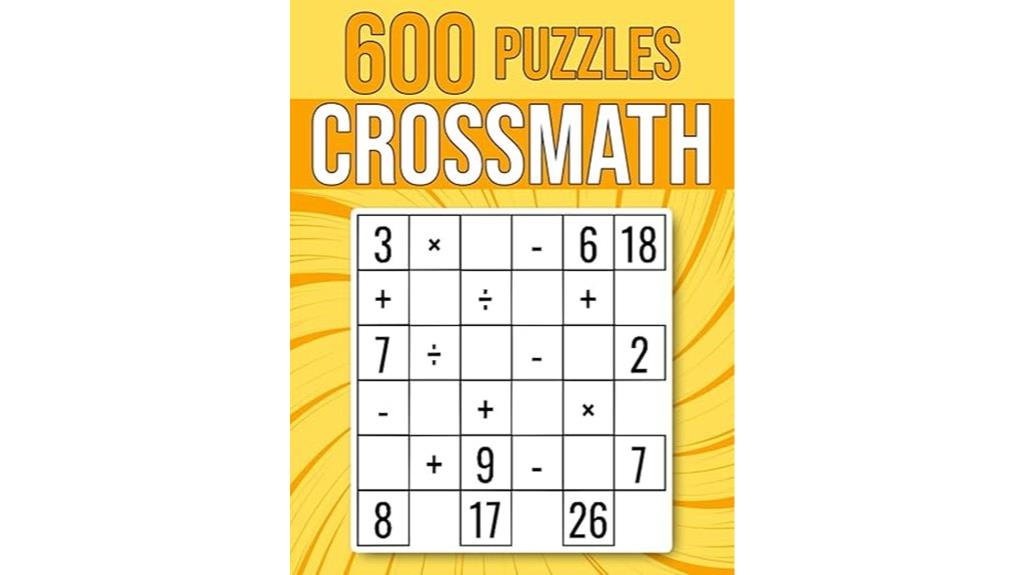
For anyone looking to sharpen their mental skills or enjoy a relaxing challenge, CrossMath Puzzles for Kids and Adults offers a versatile collection of 600 puzzles that suit all ages and skill levels. These puzzles cover basic operations like multiplication, division, addition, and subtraction, with difficulty levels ranging from easy to challenging. Many users find them engaging for brain training or simply relaxing with numbers. The first 120 puzzles are praised for their quality and enjoyment, though some report difficulty spikes and occasional errors. Despite some flaws, this book remains popular for its variety and ability to stimulate both kids and adults in a fun, educational way.
Best For: parents, teachers, and puzzle enthusiasts seeking a wide variety of math challenges for all ages and skill levels to promote mental exercise and relaxation.
Pros:
- Offers a large collection of 600 puzzles covering basic arithmetic operations.
- Suitable for both kids and adults, catering to different difficulty levels from easy to hard.
- Encourages brain training and relaxation through engaging math puzzles.
Cons:
- Contains typos and errors that can hinder puzzle solving and cause frustration.
- Experience may decline as difficulty spikes in later puzzles, reducing enjoyment.
- Some users find the puzzles too challenging or lose interest when puzzles become too difficult or errors are present.
Logic Workbook for Gritty Kids: Math Puzzles & Brain Games
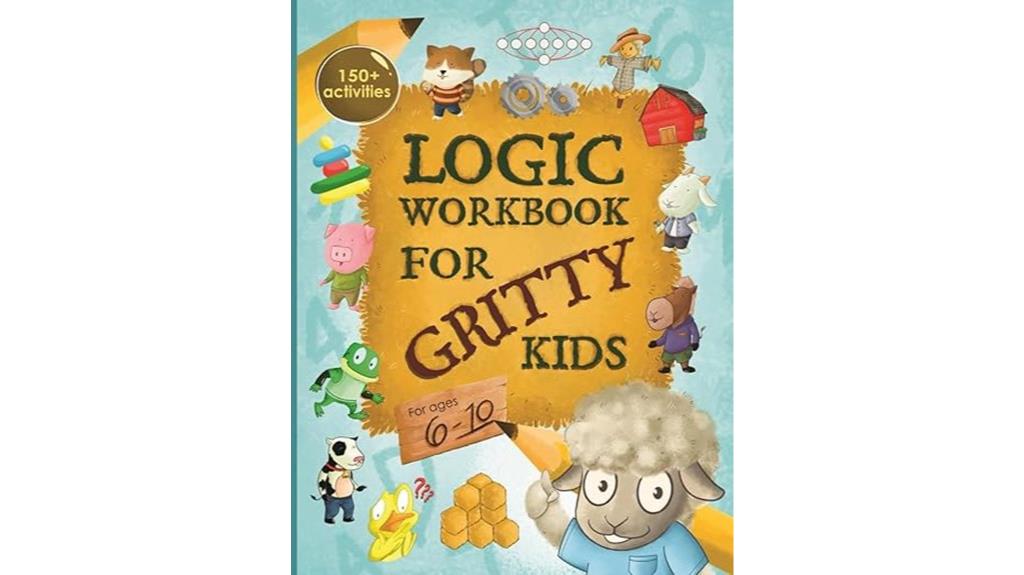
The “Logic Workbook for Gritty Kids” stands out as an excellent choice for parents and educators seeking engaging activities that develop critical thinking and problem-solving skills in children aged 6 to 10. This workbook offers a variety of fun, challenging puzzles that promote spatial reasoning, logic, and perseverance. It caters to different ability levels, making it suitable for both beginners and advanced learners. Kids enjoy the brain games and word problems, which build confidence while fostering STEM skills. With an answer key included, children can learn independently or with guidance, making it a versatile tool to inspire a love of learning and resilience.
Best For: parents and educators seeking engaging, challenging activities to develop critical thinking, problem-solving, and STEM skills in children aged 6 to 10.
Pros:
- Offers a wide variety of fun, stimulating puzzles that cater to different ability levels.
- Encourages perseverance and confidence through engaging brain games and logic challenges.
- Includes an answer key for self-assessment and independent learning.
Cons:
- Some activities may be too difficult for younger or less experienced children without guidance.
- Requires parental or educator involvement for optimal engagement with certain puzzles.
- The difficulty level varies, which might necessitate careful selection to prevent frustration.
The 125 Best Brain Teasers of All Time
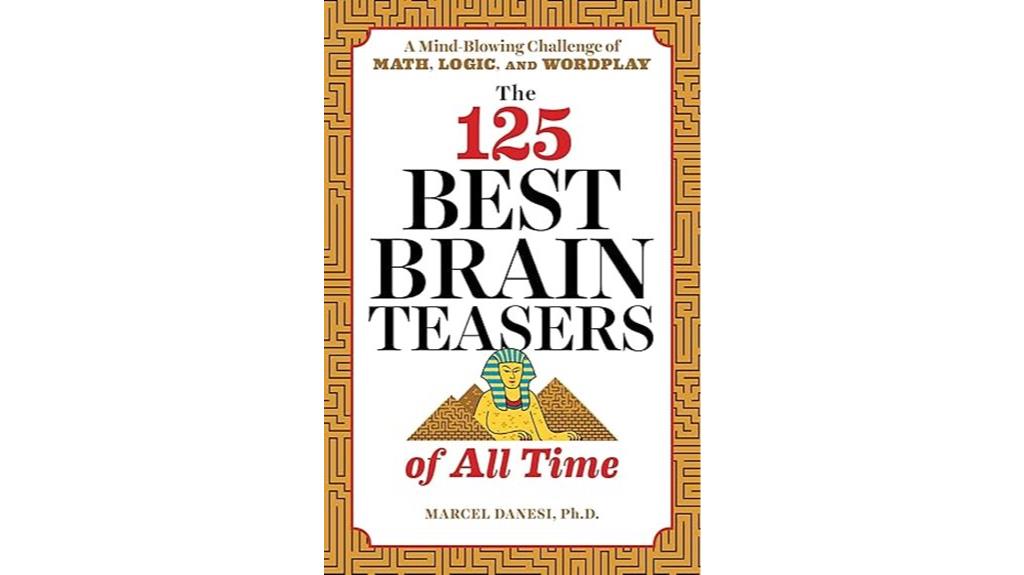
Are you looking for a collection that challenges your mind across various difficulty levels? “The 125 Best Brain Teasers of All Time” is perfect for anyone seeking to sharpen their thinking skills, from beginners and kids to seasoned puzzle enthusiasts. This book offers a wide range of riddles, logic puzzles, wordplay, and number challenges designed to entertain and stimulate. With clear explanations and solutions, it’s suitable for all ages and skill levels. Whether you’re on a road trip, relaxing at home, or challenging friends, this collection keeps your brain active, promotes mental agility, and provides hours of engaging fun.
Best For: individuals of all ages and skill levels seeking to enhance their cognitive skills through engaging and diverse brain teasers.
Pros:
- Offers a wide variety of puzzles including riddles, logic puzzles, and wordplay for comprehensive mental stimulation
- Suitable for all ages, making it great for family activities or solo practice
- Provides clear explanations and solutions that facilitate learning and problem-solving skills
Cons:
- Some puzzles may be too easy for highly experienced puzzle enthusiasts
- Later puzzles might lack sufficient difficulty for advanced solvers seeking a challenge
- The book may not offer enough variety of puzzle types for those looking for more specialized brain exercises
The Original Area Mazes: 100 Addictive Puzzles to Solve
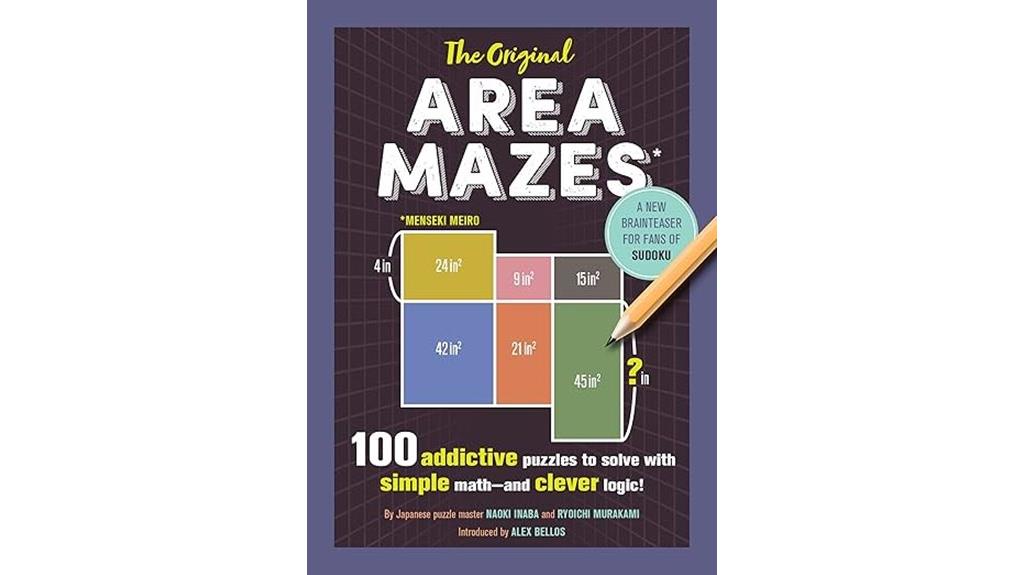
If you enjoy puzzles that challenge both your logical thinking and geometric intuition, “The Original Area Mazes” offers 100 engaging problems suitable for a wide range of skill levels. Each puzzle involves rectangles with measurements provided, and your goal is to find lengths or areas, often without drawing to scale. The book categorizes puzzles from easy to very challenging, with solutions explained step-by-step. All problems use whole numbers, making calculations straightforward. Whether you’re a beginner or an experienced solver, these puzzles stimulate your reasoning, creativity, and algebra skills, providing addictive mental exercise that keeps you engaged and thinking critically.
Best For: puzzle enthusiasts of all ages seeking to enhance their logical reasoning, geometric intuition, and problem-solving skills through engaging and progressively challenging area maze puzzles.
Pros:
- Offers a wide range of difficulty levels suitable for beginners to advanced solvers.
- Provides clear, step-by-step solutions that help improve understanding and learning.
- Promotes critical thinking, creativity, and mental flexibility with minimal use of complex math.
Cons:
- Some puzzles may require additional scratch paper or algebraic manipulation, which could be inconvenient for quick solving.
- The puzzles are not drawn to scale, which might initially confuse some solvers.
- Limited to basic math concepts; more advanced geometric challenges are not included.
Factors to Consider When Choosing a Math Puzzle Book

When choosing a math puzzle book, I always consider who will be using it, including their age and skill level. I also look for a good mix of puzzle types and educational value to keep things engaging and beneficial. Finally, I check the visual design to make sure the book is inviting and easy to navigate.
Age Appropriateness
Choosing the right math puzzle book depends heavily on the child’s age, as it guarantees the content matches their developmental and cognitive abilities. Selecting age-appropriate puzzles ensures they’re challenged without feeling frustrated or bored. Look for books designed with children’s reading levels and attention spans in mind, using visuals and simple instructions to engage younger learners. It’s important to check if the difficulty progression matches the child’s current math skills, fostering confidence and encouraging growth. For early learners, opt for books with colorful illustrations and straightforward tasks, while older children may enjoy more complex puzzles that stretch their thinking. Matching the puzzle book to their age guarantees they stay motivated and enjoy learning math through fun, manageable challenges.
Difficulty Level
Have you ever picked a math puzzle book that was either too easy or too overwhelming? Finding the right difficulty level is key to staying motivated and making progress. It’s important to choose a book that matches your current skill, whether you’re a beginner or an advanced solver. Look for books that gradually increase in complexity so you can build confidence while sharpening your skills. A good puzzle book offers a variety of challenge levels within the same volume, keeping things interesting and catering to different interests. Make sure the puzzles are clearly explained, and check if hints or solutions are provided, especially for tougher challenges. A well-balanced difficulty keeps you engaged without frustration, fostering growth and mental stimulation.
Puzzle Variety
A well-rounded math puzzle book offers a diverse array of puzzle types to keep your mind engaged and challenged. I look for books that feature logic puzzles, number patterns, algebra, and spatial reasoning, as these cater to different interests and skills. Including puzzles with varying difficulty levels ensures the book remains stimulating for beginners, intermediate, and advanced solvers alike. I also appreciate a mix of formats like riddles, crosswords, and visual challenges, which develop multiple cognitive skills simultaneously. Themes and contexts—such as real-world scenarios or cultural references—add motivation and help connect puzzles to everyday life. Overall, variety in puzzle types, formats, and themes prevents monotony and makes the learning experience more dynamic and enjoyable.
Educational Value
When selecting a math puzzle book, it’s important to contemplate how well it promotes learning and skill development. A truly educational book offers problems that build critical thinking, problem-solving, and mathematical understanding. Look for books that include clear explanations and solutions, which help you grasp concepts and sharpen reasoning. Ideally, the puzzles should increase in difficulty, encouraging steady growth and mastery over time. Diversity in question types—such as logic, number theory, and pattern recognition—is essential for a well-rounded learning experience. Additionally, the content should align with educational standards or curriculum themes, ensuring relevance and reinforcing key math skills. A book with strong educational value makes your learning process effective, engaging, and practically beneficial.
Visual Design
Choosing a math puzzle book with effective visual design is essential for an engaging and accessible learning experience. Clear, legible fonts ensure puzzles are easy to read and interpret, reducing frustration. Visual elements like diagrams, illustrations, and color coding can clarify complex ideas and boost engagement. A well-organized layout with enough spacing prevents clutter, making it easier to navigate between puzzles and solutions. Consistent visual cues such as arrows or highlights guide you through multi-step problems, helping you stay focused. Additionally, an attractive cover and page design can motivate you to immerse yourself and enjoy the learning process. When selecting a book, pay attention to these visual factors—they can make a significant difference in how effectively you learn and enjoy solving puzzles.
Solution Accessibility
Clear visual design makes puzzles enjoyable and easy to interpret, but accessible solutions are equally important for effective learning. When choosing a math puzzle book, I look for clear, step-by-step solutions or answer keys that help me understand the reasoning behind each problem. Detailed explanations are essential—they show me where I went wrong and guide me toward better problem-solving strategies. I also prefer books that offer quick-reference solutions for review, as well as more detailed ones for deeper understanding. Accessibility matters, too—I want solutions that are easy to find, whether at the back of the book or online. A good balance between challenge and support ensures I can learn without frustration, regardless of my skill level.
Physical Quality
The physical quality of a math puzzle book plays a crucial role in how enjoyable and practical it is to use. High-quality paper makes the book more durable and allows for easy erasing of mistakes, so you can revisit puzzles without worry. A sturdy binding prevents pages from falling out or tearing, especially if you solve puzzles on the go or frequently flip through pages. Smooth, thick paper reduces glare and eye strain, letting you focus longer without discomfort. Well-printed puzzles with clear, crisp graphics improve readability, minimizing confusion and frustration. Additionally, a compact, well-designed layout ensures puzzles are easy to see and work through, making the experience smoother and more satisfying. Overall, paying attention to physical quality enhances both comfort and longevity.
Thematic Focus
When selecting a math puzzle book, considering its thematic focus helps guarantee it aligns with your learning goals and interests. Thematic focus determines the skills and concepts emphasized, such as logic, pattern recognition, or arithmetic. Some books focus on recreational puzzles like riddles and brain teasers, while others target specific areas like algebra, geometry, or number theory. This focus also influences the difficulty level, with certain themes suited for beginners, children, or advanced learners. Choosing a book aligned with your interests or targeted skills ensures the puzzles are relevant, engaging, and challenging enough to promote growth. A well-chosen theme keeps you motivated and makes learning both effective and enjoyable, helping you develop particular mathematical skills with greater focus.
Frequently Asked Questions
Which Age Group Benefits Most From These Math Puzzle Books?
I believe math puzzle books benefit a wide range of ages, but I’ve noticed that middle school and high school students gain the most. They’re at a perfect stage to develop critical thinking and problem-solving skills. However, I’ve seen younger kids enjoy simpler puzzles, and adults find them stimulating too. No matter your age, these books can challenge your mind and make math fun!
Are These Books Suitable for Self-Study or Classroom Use?
These math puzzle books are absolutely suitable for both self-study and classroom use. I find they’re great for independent learners who want to challenge themselves, as well as teachers looking to make math engaging for their students. The puzzles are versatile and can be adapted to different skill levels, making them perfect for individual exploration or group activities. I highly recommend incorporating them into your learning or teaching routine.
Do the Puzzles Align With Specific Educational Standards or Curricula?
Yes, many of these puzzle books align well with educational standards and curricula, making them practical for classroom use or self-study. I find that they often incorporate concepts from common core or other frameworks, helping students develop critical thinking, problem-solving, and mathematical reasoning skills. These puzzles are designed to complement learning goals, making math engaging and relevant while reinforcing key standards in an enjoyable way.
Can These Books Help Improve Standardized Test Scores?
Yes, these books can help improve standardized test scores. I’ve found that working through challenging puzzles sharpens problem-solving skills, boosts critical thinking, and enhances math fluency—all essential for test success. When I practice regularly with engaging puzzles, I notice my confidence and accuracy grow. So, if you want to improve your scores, I recommend diving into these books—they’re fun, educational, and highly effective for boosting your math abilities.
Are Solutions and Explanations Provided Within the Books?
Yes, most of these books include detailed solutions and explanations. I’ve found that they really help me understand tricky problems better. The step-by-step breakdowns clarify my thinking and show me where I might go wrong. Having solutions readily available makes practicing more effective and less frustrating. If you’re looking to truly grasp challenging concepts, I recommend choosing books that provide thorough explanations along with the puzzles.
Conclusion
Diving into these math puzzle books is like opening a treasure chest of hidden gems—each puzzle a sparkling jewel waiting to challenge and delight you. Whether you’re solving riddles or exploring new concepts, these books will sharpen your mind and ignite your curiosity. So grab one, start your adventure, and let your brain dance through the labyrinth of numbers. After all, every puzzle solved is a victory shining brighter than the last.
